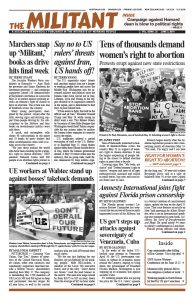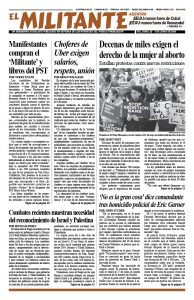President Donald Trump and South Korean President Moon Jae-in will hold a summit in South Korea in June to discuss “denuclearization” of the Korean Peninsula, the White House and Blue House announced May 16. South Korean newspaper Hankyoreh said in an editorial it hopes the meeting will become “a trilateral summit” and include North Korean leader Kim Jong Un.
Meanwhile, the U.S. government continues what the White House calls “maximum pressure” on North Korea, using harsh economic sanctions to press for a deal. Washington wants Pyongyang to shut down its nuclear weapons and long-range missile capabilities.
The U.S. sanctions regime is bipartisan. Democratic Party presidential candidate Bernie Sanders told ABC May 4 he agrees with President Trump’s approach, including keeping economic pressure on the North.
But it’s working people in North Korea who are paying the biggest price under the imperialist economic squeeze. The U.N. says that 40 percent of North Korea’s 25 million people need food assistance.
Since the last summit meeting between Kim and Trump, in February, ended without an agreement, the U.S. and North Korean governments have sometimes exchanged sharp words. On two occasions the Democratic People’s Republic of Korea fired salvos of short-range missiles into the sea. The Trump administration responded with protests, but said the launch was not significant enough to scuttle negotiations. One day after the North’s most recent missile launch, Secretary of State Mike Pompeo said the U.S. is eager to “get back to the table.” And President Trump tweeted, “Deal will happen!”
The U.S. government has maintained the suspension of its provocative annual war games near the border.
U.S. prosecutors filed claims in federal court in New York May 7 to take permanent possession of the Wise Honest, North Korea’s second largest cargo ship. The vessel had been carrying a load of coal valued at $2.9 million when it was seized by Indonesian authorities in April 2018. In mid-May this year it was towed to American Samoa.
Washington said the ship had also been used to import heavy machinery to the North, also a sanctions violation.
On May 14, the North Korean ambassador to the U.N. sent a letter to U.N. Secretary-General Antonio Guterres demanding the ship’s return, saying the seizure is a violation of North Korean sovereignty.
In both 2016 and 2017, the Security Council approved U.S.-backed sanctions banning North Korea from exporting coal, as well as iron ore, textiles and fish.
At the end of the second imperialist war in 1945, U.S. troops — with the acquiescence of the Stalinist regime in Moscow — divided the peninsula in two against the will of the Korean people. Washington installed Syngman Rhee as ruler in the South. In the North working people rose up and brought a workers and farmers government to power, which nationalized capitalist factories and landholdings.
Decades of U.S. assaults
In 1950 after repeated massacres against workers and peasants by the Rhee regime, war broke out. U.S. and allied troops pushed deep into the North, seeking to conquer the entire country and place troops on the Chinese border. Massive U.S. bombing and napalm leveled almost every building in the North and a considerable part of the South.
With the help of Chinese volunteers, North Korean forces pushed the U.S.-led forces back to the 38th parallel, and fighting came to a halt in 1953. The was the first military defeat for U.S. imperialism.
To this day the U.S. government refuses to sign a permanent peace treaty.
“The Socialist Workers Party calls for the immediate lifting of all sanctions against North Korea,” said Joel Britton, SWP candidate for mayor of San Francisco, May 17. “And we fight for an end to all U.S. imperialist interference in the sovereign affairs of the Korean people. We are for getting rid of all nuclear weapons of any origin on the Korean Peninsula and surrounding air and waters, including Washington’s so-called nuclear umbrella over South Korea and Japan.
“This would also put working people in North and South in the best position to advance toward reunifying their country,” Britton said. “Korea is one!”

